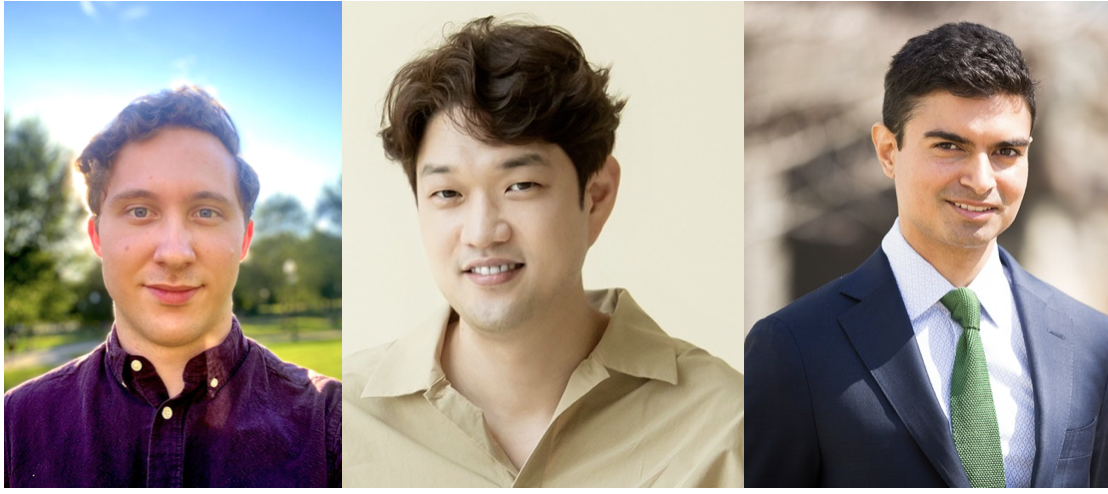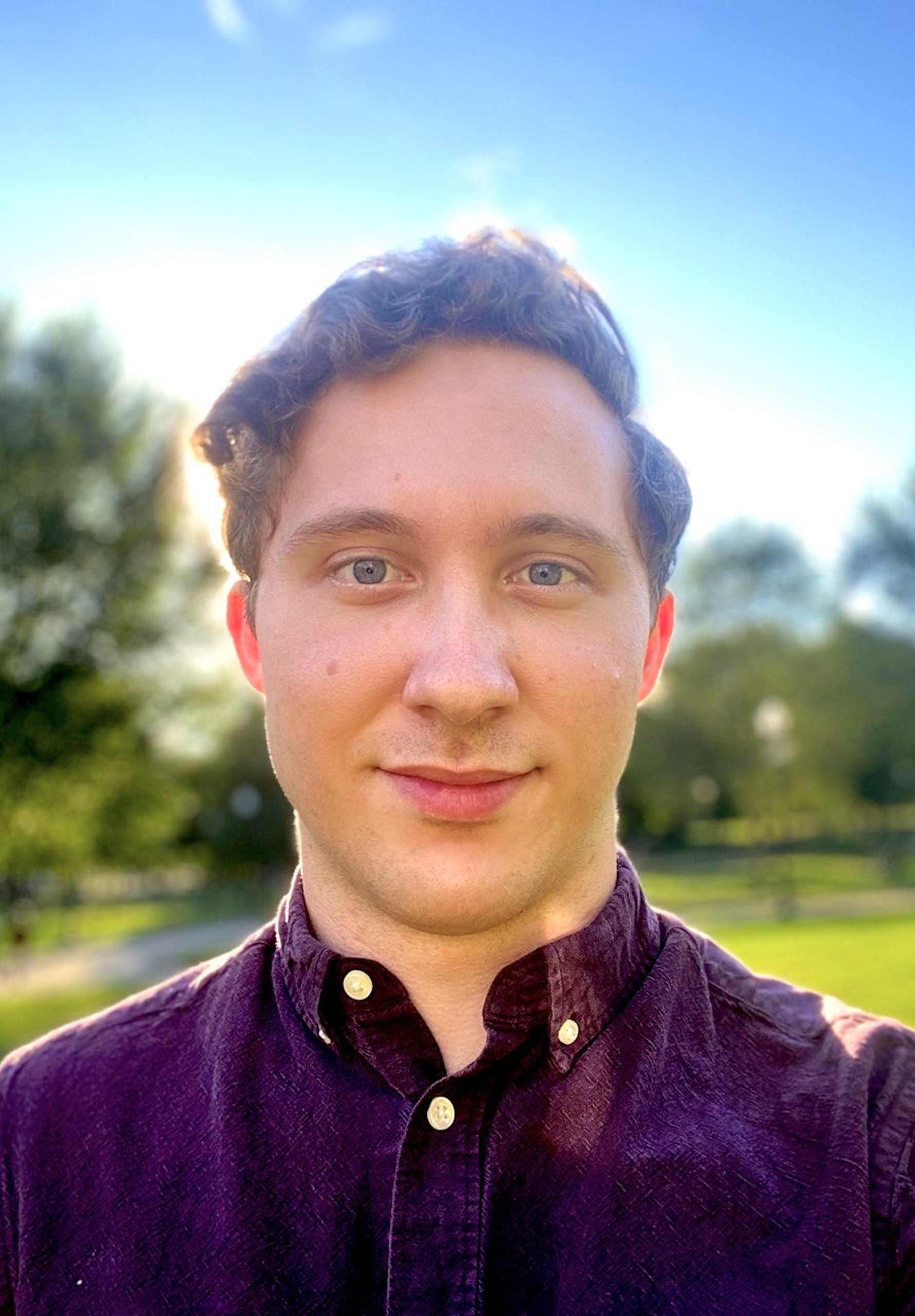New MCSC Impact Fellows Bring Expertise from Environmental Policy & Planning, Physics, Finance, and Anthropology
November 4, 2022

(L-R) Evan Coleman, Jungwoo Chun, and Aneil Tripathy joined the MCSC in Fall 2022
The MIT Climate & Sustainability Consortium (MCSC) Impact Fellowship Program is a postdoctoral opportunity for individuals who want to have a real-world impact on global climate and sustainability issues – transcending academia and industry to apply their expertise to near-term change for a more sustainable future. The program, launched in 2021, allows Fellows to work with MIT faculty and consortium industry members, in collaboration with external organizations and communities, to shape and implement solutions needed for global economic transformation to address the global climate change and sustainability crisis. MCSC Impact Fellows have been advancing the Consortium’s work in its core focus areas, which include tough transportation modes, value chain resilience, circularity, natural carbon sinks, carbon capture and storage, data, and social dimensions.
Jungwoo Chun, a graduate of the doctoral program at the MIT Department of Urban Studies and Planning (DUSP), holds a PhD in Environmental Policy and Planning. His dissertation involved investigating clusters of intermediaries that support community ownership of solar energy projects in the United States. He has extensive research, teaching, and professional experience related to various aspects of climate change and sustainability with a particular focus on climate justice and resilience. Read more about his background in this recent MIT News story.
At MIT DUSP, Jungwoo led and supervised a group of UROPs conducting exploratory research on the sources of opposition to utility-scale renewable energy projects, presenting the findings to the wider MIT audience in Cambridge, MA, notably at the MIT Energy Night 2021 and the MIT Energy and Climate Hack Research Symposium 2021. He previously directed the MIT Cybersecurity Clinic, leading the client recruitment process and overseeing student team engagement with the client communities seeking to combat growing cybersecurity threats. The Clinic (11.074/11.274) has been so successful that it inspired a Consortium of University-based Cybersecurity Clinics modeled on the MIT Clinic. He was a graduate instructor for a number of courses in DUSP including 11.601 (Introduction to Environmental Policy and Planning), 11.255 (Negotiation and Dispute Resolution in the Public Sector), and was a co-instructor of 11.382 (Water Diplomacy: The Science, Policy, and Politics of Managing Shared Resources).
As an Impact Fellow at the MCSC, Jungwoo hopes to integrate the interests of the industry, local communities, governments, and scientists and formulate strategies for joint fact-finding and joint problem-solving. One of his goals is to further develop and apply the Equitable Resilience Framework (ERF) in the context of climate resilience—a finalist idea in MIT’s Climate Grand Challenge—while ensuring that the proposed solutions are fair, equitable, and contributes to long-term structural change.
“It’s indeed an exciting yet challenging new venture for me to take a planning thought process and transform it into a corporate strategy for companies,” said Jungwoo. “There is opportunity for companies to successfully apply a holistic corporate strategy that addresses climate challenges and also ensures social equity.”
Read Jungwoo’s bio.

Addressing climate-critical challenges frequently comes down to solving the same class of problem, but at different industrial scales.
Evan Coleman holds a PhD in theoretical high-energy physics from Stanford University. During his doctoral studies, he developed computational frameworks for the study of quantum gravity in inflationary universes. In his undergraduate years at Brown University, he contributed to the CMS Experiment at CERN, where he worked on precision top quark property measurements and optimized the design performance of future collision detectors.
While at Stanford, Evan’s interest in climate and sustainability efforts grew out of his supplementary coursework, as well as regular volunteer work at the Stanford Educational Farm. His main research with the Consortium targets terrestrial sinks of carbon—soils and biomass—for measurement and enhancement of their atmospheric carbon sequestration potential. Evan is developing scalable procedures which can rigorously budget the carbon distributed among natural systems on our planet, with an overarching mission to better enable carbon marketplaces to represent the true economic value which is extracted in climate change mitigation efforts. In this vein, Evan combines hardware, software, and physics modeling expertise to develop sensible measures for soil carbon sequestration, both in rates and sum totals. These include, for example, the application of NMR, spectral unmixing techniques, and hyperspectral Earth observation data to deploy physics-based, ML-accelerated systems for tracking the organic and inorganic carbon content of soil.
In parallel with his research efforts, one of Evan’s major goals is to help Consortium members anticipate the scientific and regulatory future they face in carbon marketplaces and maximize their first-mover advantage as they work to achieve climate and sustainability targets.
“I think the extant opportunity at the MCSC to generate synergy across disparate fields and marketplaces is particularly exciting,” Evan said. “Addressing climate-critical challenges frequently comes down to solving the same class of problem, but at different industrial scales.”
Read Evan’s bio.

I intend to be a bridge between cutting edge research teams at MIT and industry members interested in working on proposed solutions to climate change that involve financial markets.
Aneil Tripathy is an economic and climate anthropologist who has both analyzed and worked in climate finance since 2014. He holds a PhD in anthropology from Brandeis University. Aneil uses ethnographic research methods to understand and explore responses to climate change in financial markets.
Aneil was most recently a Postdoctoral Researcher at the University of Bologna on the European Research Council-funded Impact Hau project. Aneil is a core member of the Energy and Climate Finance Network (ECFN) in the University of St Andrew’s Centre for Energy Ethics and has been a visiting researcher at Bayes Business School, Lancaster University, and was an associate of University College London’s Centre for An Anthropology of Sustainability (CAOS). Aneil has six peer-reviewed publications in Economic Anthropology, Journal of Environmental Investing, and Focaal. He has written for a range of public blogs, co-founded a top anthropology podcast and has produced podcast series for several outlets. Aneil’s latest series on climate anthropology was for the Society for Economic Anthropology’s Mergers & Acquisitions podcast. At the Climate Bonds Initiative, Aneil has been a policy researcher, executive associate, and an academic research consultant, working to shift debt capital markets towards climate change solutions.
As an Impact Fellow, Aneil manages cross-discipline conversations and research around climate finance at the MCSC. He is also a member of the MIT Sloan Aggregate Confusion Project under MCSC Faculty Steering Committee member Professor Roberto Rigobon.
“I am very excited to work closely with the MCSC core team and with the MIT community on climate change challenges,” said Aneil. “I intend to be a bridge between cutting edge research teams at MIT and industry members interested in working on proposed solutions to climate change that involve financial markets.”
Read Aneil’s bio.
